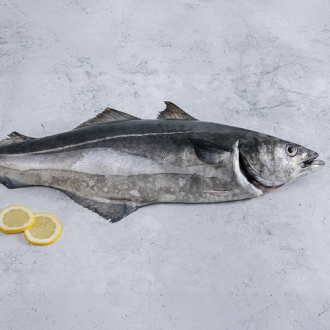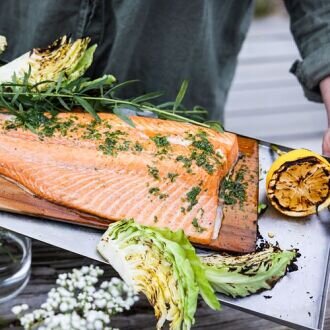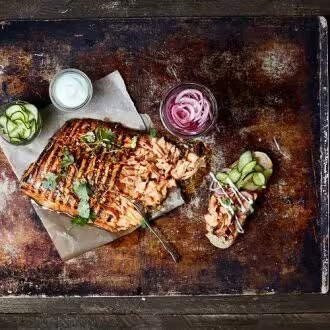What makes Norwegian cod so special? Here are 8 good reasons you should choose Norwegian origin when it comes to cod.
1. Norwegian cod is sustainable
Nearly all cod from Norway comes from the Northeast Arctic cod stock, the biggest cod stock in the world. The International Council for the Exploration of the Sea (ICES) considers this stock at full reproductive capacity and every year Norway and Russia negotiate their share of the quotas according to the advice by ICES. Read more about how Norway and Russia made a cod fishery live and thrive.
Read more about why Norwegian cod is sustainable.
2. Norway has the perfect conditions for quality cod
In the abundant cold and clear waters along our long coastline and in the icy currents of the Barents Sea, our cod thrive in vast numbers. It may be a harsh and cold climate on land, but for the cod swimming in our seas, it is paradise, giving Norwegian cod its unique firm and white flesh and unsurpassed delicious taste.
Read more about Norwegian cod.
3. Because Norwegian cod is more than "just a cod"
Fresh, frozen or cured - there’s more to our humble cod than what meets the eye. As a pillar of our history for thousands of years, Norwegians have perfected the crafts of honing our national fish into the most delectable products favoured by culinary experts around the world.
They are all different and unique in their own ways, but all derive from the same high quality Norwegian cod, caught with precision and care.
- Norwegian stockfish requires no preservatives, just the power of nature. Dried in the optimal natural conditions in the cold and fresh winds of Arctic Norway, it is cherished by connoisseurs in Italy and beyond. Stockfish from Lofoten has even been awarded Protected Geographical Classification by the EU. Read more about Norwegian stockfish.
- Norwegian clipfish, better known as Bacalhau da Noruega, is another major part of our proud seafood heritage. Salted and matured to perfection, our clipfish is revered in great numbers by the Portuguese, and many other bacalhau-loving nations across the world. Read more about Norwegian clipfish.
- Skrei – the crown jewel of cods - the migratory cod from the icy depths of the Barents sea arrives in its physical prime along the Norwegian shores every winter, as it has done for thousands of years. Quality labelled Norwegian skrei is the best of the best, quality controlled and handled according to strict requirements from catch to market. Read more about Norwegian skrei.
- Frozen at sea cod (FAS) may not carry the same history the rest, but is one of the finest seafood products around. It is a particular favourite of top fish and chip restaurants in the UK. The cod is filleted and frozen within minutes of being caught, and frozen to a staggering -20֯C onboard modern vessels in accordance with Hazard Analysis Critical Control Point systems (HACCP). They are also approved by the Norwegian Food Safety Authority, ensuring Norwegian cod meets the highest possible quality standards and enables Norwegian seafood producers to deliver consistent high-quality cod year-round.
4. Quality you can trust
Norwegian cod is quality cod. Our fishermen and women are craftspeople who take great pride in carefully handing the fish from capture and right though to packing and shipping.
Thriving local communities dotted all along our coast provides efficient infrastructure, ensuring swift and reliable logistics and preserving the cod’s pristine quality.
Norway works closely with EU Food Law and we were one of the first to introduce a traceability system for fish. Through this system, we’re able to say exactly where your cod was caught and what equipment was used.
5. Bigger fish with a delicate flavour
Whilst size doesn’t matter for flavour, our cod tends to be bigger in size, yielding large fillets with brilliantly white flesh and a delicate flaking texture. Growing up in the icy waters of the Arctic, Norwegian cod develops a unique and mild flavour which is perfect for a wide variety of dishes. Read more about Norwegian cod recipes.
6. Cod - a sustainable superfood
Eating fish is good for us and the planet. As a wild-caught, sustainably managed fishery, Norwegian cod has a very low carbon footprint.
It is super healthy too. With a fat content typically lower than three percent, it is an incredibly lean option, pretty much carbohydrate-free and packed full of healthy protein. Add a daily recommended dose of Omega-3, vitamin A and B12, selenium and iodine, and you’ll struggle to find anything healthier to put on your dinner plate.
Read more about the benefits of eating Norwegian cod.
7. The value of the Seafood from Norway origin label
Three in four consumers say origin is of great importance when choosing seafood, according to our annual seafood consumer survey – the biggest of its kind.
Clearly communicating the origin of seafood makes sense also from a business perspective, as 3 in 5 consumers say they are willing to pay a premium for seafood with clear origin labelling, such as the Seafood from Norway origin mark. Read more about the Seafood from Norway origin label. (Source SCI, 2020, Norwegian Seafood Council)
Obtaining licensing rights for the Seafood from Norway label enable merchants to benefit from the global marketing efforts led by the Norwegian Seafood Council, the world’s largest generic seafood marketing organization, including applying for jointly financed campaigns for Norwegian seafood.
8. A proud history kept alive in kitchens around the world
The cod is the very reason people were able to settle this far north, providing vital nutrition to sustain communities throughout our harsh winters. Cod is Norway’s oldest export, dating back to when stockfish provided much needed sustenance for the epic voyages of the Vikings. Leiv Eriksson was said to have supplies of dried cod with him when he discovered America – centuries ahead of Columbus.
Today, this ancient history is being kept alive through culinary traditions with Norwegian cod, clipfish and stockfish in far flung markets such as Nigeria, the Caribbean, Brazil and Italy.
Find recipes with Norwegian cod.





